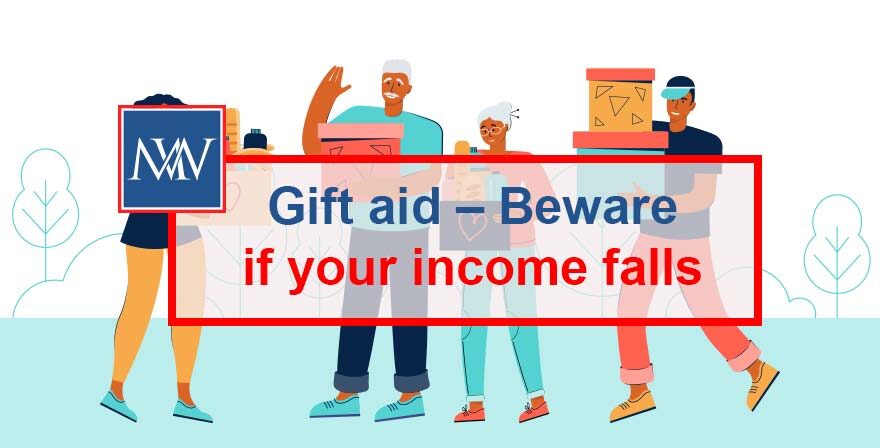
Gift aid – Beware if your income falls
Where a Gift Aid declaration is made, the recipient charity or community amateur sports club can claim back basic rate tax on the donation. The donation is treated as made net of basic rate tax, meaning that for every £1 donated, the charity can claim back 25p, or to put it another way, a donation of £80 is worth £100 to the charity.
There is good news for higher and additional rate taxpayers too – they can claim the difference between the rate at which they pay tax and the basic rate of tax, either through their self-assessment tax return, or if they do not complete a tax return, by asking HMRC to amend their tax code. For example, if a higher rate taxpayer made a donation of £100, the charity will claim back £25 – so the donation is worth £125 to the charity. The taxpayer receives relief at 40% on the gross donation of £125, i.e. £50, of which £25 is given at source (the taxpayer pays £100 for a £125 donation). The remaining £25 is claimed back by the taxpayer.
Funded by tax paid
The tax that is claimed back by the charity is funded by the tax paid by the donor. This is fine where the donor has paid more tax in the year than is claimed back by charities and community amateur sports clubs on donations.
However, a problem can arise if the donor’s income falls, such that they are not a taxpayer or pay less tax than is claimed back on the donation. Where this is the case, HMRC can seek to recover the tax reclaimed by the charity from the donor.
Example
Amy is self-employed hairdresser. She makes a donation of £20 each month to an animal rescue charity. She makes a Gift Aid declaration so the charity can reclaim tax at the basic rate on the donation.
Due to the Covid-19 pandemic, Amy was unable to work for much of 2020/21. She was unable to claim support under the SEIS scheme as she only started her business in January 2020. Her earnings for 2020/21 fell to £8,000. Previously, she had always earned around £20,000.
As her earnings for 2020/21 are less than the personal allowance of £12,500, she does not pay any tax for 2020/21. Therefore, there is no tax to fund the tax claimed back by the charity of £60 (25% (£20 x 12). HMRC could seek to recover this from Amy.
Tips
Where regular donations are covered by a Gift Aid declaration review these and cancel the Gift Aid declaration if it looks as if income may fall below the personal allowance. For one-off donations, only complete the Gift aid declaration if income is such that sufficient tax will be paid to cover that claimed on the donation.
For more information , Book a Free Consultation
Need Accountancy Support?
For information on bespoke training, or if you have any other questions for Makesworth Accountant, please fill in your details below
















 151
151